Dallas Truck Accident Lawyer
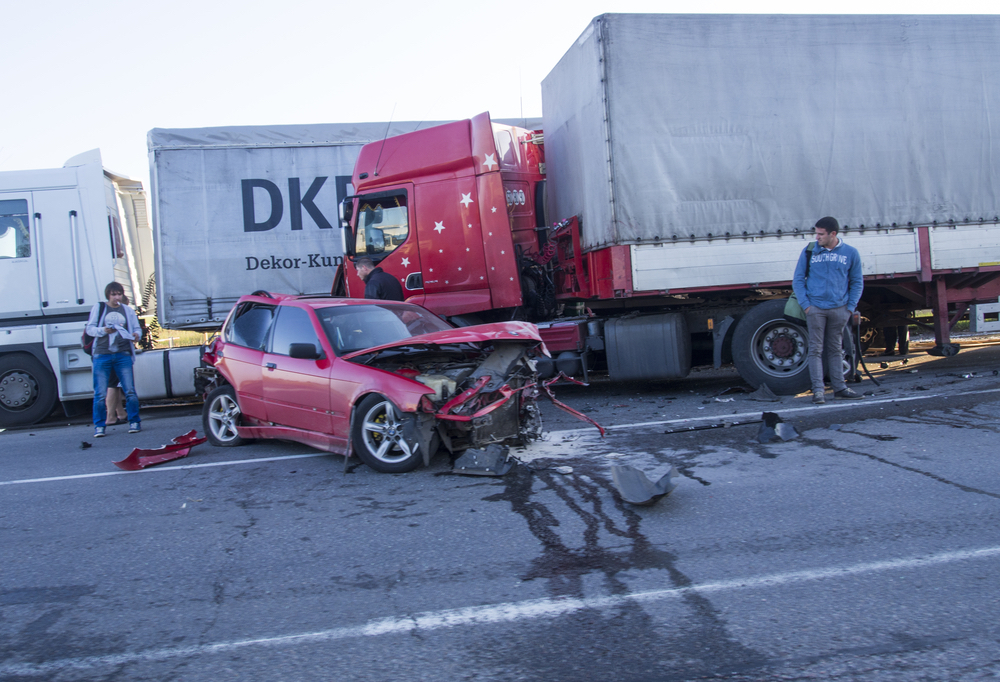
Legal Assistance For Truck Accident Victims
If you’ve been in a collision with a semi truck that wasn’t your fault, you have legal rights, and our Dallas, TX truck accident lawyer can help you learn more about them. At Brandy Austin Law Firm, we represent personal injury victims like you who have been hurt in traffic accidents. Our mission is to secure full and fair compensation for all your losses, from medical bills to replacing your vehicle, and consideration for the trauma of the experience. We offer free consultations, so please call us today to discuss your case.
After a trucking accident, victims may need help from a trucking accident lawyer in Dallas, TX at Brandy Austin Law Firm, PLLC to manage the significant impact it has had on their lives and for assistance pursuing a legal claim. Proving fault can get complicated, especially when victims are up against the possibility that multiple parties may be responsible. This can easily become overwhelming for an accident victim who may be managing serious injuries. Proving liability is best suited for a Dallas trucking accident lawyer who has the experience and tenacity to pursue a truck accident case while victims recover from their injuries.
Key Elements to Accident Cases
When pursuing a truck accident case against the responsible party, a trucking accident lawyer in Dallas, Texas can work to make sure that key personal injury elements were present in the accident. When all of the elements can be proven, we can assist accident victims in obtaining the compensation they deserve. We can work with victims to gather evidence that proves the truck driver or company:
- Owed a Duty of Care
- Breached their Duty of Care
- Negligence was the Result of the Accident
- Injuries or Damages Occurred
It will be essential that you are able to prove these elements were at play in order to obtain damages following a trucking accident. In doing so, the truck company or driver may be required to provide you with compensation for the damages you have suffered.
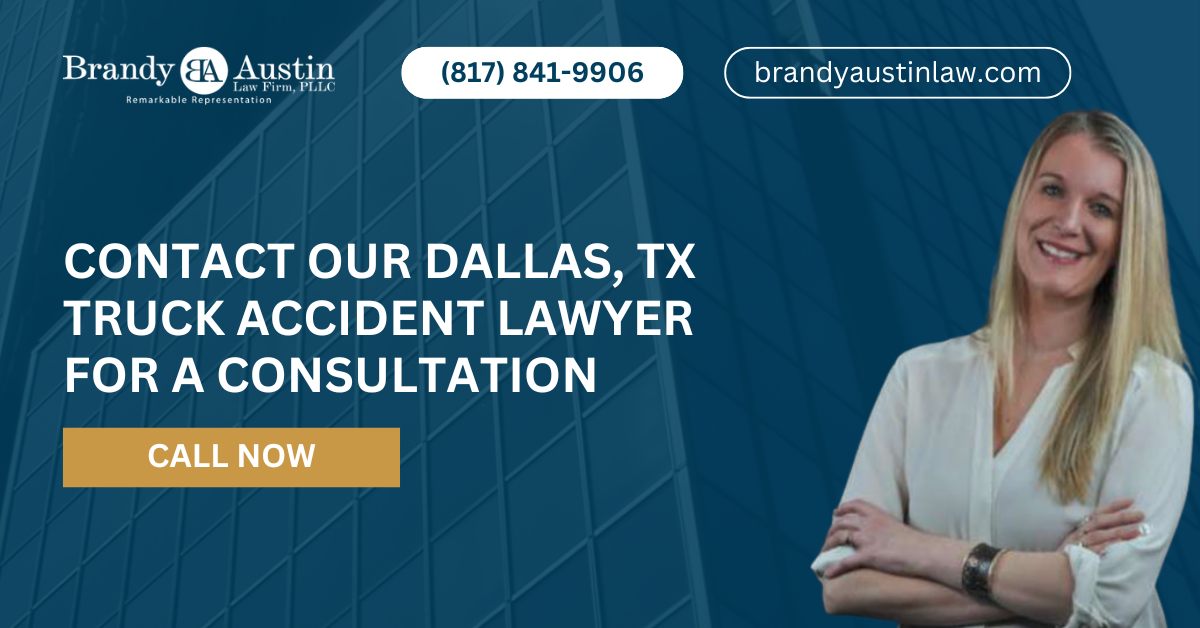
Reasons the Trucking Company or Driver May be Responsible
There is tremendous pressure placed on truck companies and their drivers to perform efficiently. When a truck accident occurs, it may be likely that multiple parties are responsible for the accident. Truck companies, drivers and even manufacturers may be held at fault for the accident.
Trucking Companies may be responsible for:
- Improper Truck Inspections
- Improper Loading of Cargo
- Poor Maintenance of the Truck
Truck Manufacturers may be responsible for:
- Defective Parts
Truck Drivers may be responsible for:
- Distracted Driving
- Fatigue
- Alcohol or Drug Use
- Reckless Driving
It may be obvious that the claims process can become complicated rather quickly with so many potential parties involved. Working with an experienced TX trucking accident lawyer in Dallas can help victims sort through the complicated legal process. If you have been victim to a trucking accident, it’s important that you not hesitate in contacting a lawyer as soon as possible.
The Compensation You Deserve
Trucking accidents often produce results that are incredibly serious and in some cases, fatal. Truck accidents often cause more damage than the average car accident. Because of this, it’s important that you work with our team at Brandy Austin Law Firm, PLLC so we can review your case and properly value your claim. Common factors that may be considered include:
- Property Damage
- Total Medical Expenses
- Current
- Long Term
- Loss of Earning Capacity
- Noneconomic Damages
- Pain and Suffering
- The Effect on Your Family
- Physical Limitations
Trucking accidents at the hands of the truck driver or trucking company may be the result of negligence. Because trucking companies are so focused on their bottom line, they may cut corners in efforts to deliver goods as efficiently as possible. This is no way to proceed with doing business, especially when it puts the lives of others at risk. Accident victims deserve to have their rights protected with the help of a truck accident lawyer. To move forward with taking action against the negligent party, contact a Texas trucking accident lawyer in Dallas from Brandy Austin Law Firm, PLLC as soon as possible.
How Our Truck Accident Lawyer Can Help You
Truck accident lawyers are personal injury attorneys who help victims of truck crashes assert their legal rights, including the right to fair compensation for losses suffered in the wreck. In the aftermath of a nasty truck crash, even if both vehicles were going at low speeds, there’s a good chance that you suffered life-changing or disabling injuries. Your medical bills may quickly add up, and you’re likely going to be out of work for weeks recovering from traumas like broken bones, spinal cord issues, or internal organ damage.
As your lawyer, we investigate the cause of the crash, gathering evidence to prove that the trucker was negligent. We then build the case based on Texas personal injury laws and prepare to either negotiate a settlement with the other party or take the claim to court. Our goal is to secure compensation covering the full extent of your losses, including pain and suffering and future medical costs.
Truck Accidents Can Be Unexpectedly Complicated
Truck accident claims are often more challenging than “regular” car accidents, and you need our lawyer who understands the challenges and nuances of these personal injury claims.
First, the trucker’s employer or contracted shipping company may be a co-defendant, as it may have been negligent in hiring or supervising its truckers. Second, with severe truck accident injuries, there’s a good chance that your case is worth six or seven figures, which means that the insurance company will take a much closer look at the claim. Our evidence and points of law must be solid to withstand this scrutiny.
We are very familiar with Texas and federal regulations for commercial drivers and can pinpoint where the trucker, the carrier, or both violated them. Your case deserves experience and insight—and we deliver.
Determining Liability In A Truck Accident
Unlike typical car accidents, truck accidents often involve multiple parties, extensive federal and state regulations, and significant damages.
Truck accidents can result from various factors, including driver error, mechanical failures, improper loading, and non-compliance with regulations. Determining liability and damages involves a thorough investigation into the cause of the accident. It’s vital to examine all elements, from the truck driver’s actions to the vehicle’s condition and the company’s compliance with safety standards. In some cases, liability may extend beyond the driver to include the trucking company, cargo loaders, or vehicle manufacturers.
Identifying All Potential Defendants
A critical aspect of determining liability in a truck accident is identifying all potential defendants. This can include the truck driver, the trucking company, the cargo loading team, and even the manufacturer of a faulty vehicle component. At Brandy Austin Law, we meticulously review every detail to make sure that no liable party is overlooked. Our comprehensive approach maximizes the compensation our clients can recover for their losses and damages.
The Importance Of Legal Representation
It can be overwhelming for victims and families who are deciding what to do after a truck accident. Dealing with injuries, financial burdens, and the legal challenges of determining liability requires the guidance of our seasoned truck accident attorney. We offer compassionate and comprehensive legal support to guide our clients through this challenging time. We advocate tirelessly on your behalf to make sure that justice is served and that you receive the compensation you are entitled to.
Truck Accident Legal Terms To Understand
Truck accident claims are often complicated due to federal regulations, insurance issues, and the sheer size of the vehicles involved. To help you better understand your case, our Dallas, TX, truck accident lawyers emphasize the importance of knowing key legal terms. We define this key legal terminology so you can better understand the details of your personal injury case.
- Liability
Liability refers to the legal responsibility for the damages or injuries caused by the truck accident. In most collision cases, determining who is liable can be complicated. It could be the truck driver, the trucking company, the vehicle manufacturer, or even a third party responsible for maintenance or loading the truck.
- Negligence
Negligence is a key concept in personal injury law, including truck accident cases. It refers to the failure to act with the level of care that a reasonable person would have exercised under similar circumstances. In truck crashes, negligence could mean speeding, distracted driving, failing to properly maintain the truck, or not adhering to federal trucking regulations. Proving negligence is critical in holding the responsible party accountable for the accident.
- Comparative Fault
Comparative fault, also known as comparative negligence, is a legal principle that can affect the outcome of your truck accident case. It determines how much responsibility each party holds in the accident. For instance, if you were partially at fault for the accident, your compensation might be reduced. In some states, you can recover damages even if you are partially at fault, while in others, being more than 50% at fault may prevent you from recovering any compensation.
- Damages
Damages refer to the monetary compensation you may receive as a result of a truck accident. There are two primary types of damages: economic and non-economic. Economic damages cover tangible losses such as medical bills, lost wages, and property damage. Non-economic damages address intangible losses like pain and suffering, emotional distress, or loss of enjoyment of life.
- Vicarious Liability
Vicarious liability holds a party responsible for the actions of another person. In truck accident cases, this often means that the trucking company can be held liable for the actions of its employee, the truck driver. Even if the truck driver was the one directly at fault, the trucking company may share responsibility if the driver was acting within the scope of their employment at the time of the accident.
- Statute of Limitations
The statute of limitations is the legal time frame within which you must file a truck accident claim. In most states, this period ranges from one to four years, depending on the nature of the case. In Texas, you generally have two years to bring your claim forward. If you fail to file within the statute of limitations, you may lose the right to seek compensation.
- Commercial Driver’s License (CDL)
A Commercial Driver’s License (CDL) is a special license required for truck drivers operating large vehicles. Understanding CDL regulations is important in truck accident cases, as violations of these rules can point to negligence. For example, if the driver was not properly licensed or failed to follow CDL rules, this could significantly strengthen your case.
- Federal Motor Carrier Safety Administration (FMCSA)
The Federal Motor Carrier Safety Administration (FMCSA) is the government agency that regulates the trucking industry. FMCSA sets strict rules on driver hours, truck maintenance, and safety standards. Violations of these regulations, such as exceeding driving hour limits or failing to maintain the vehicle properly, can serve as strong evidence of negligence in a truck accident case.
Dallas Truck Accident Infographic
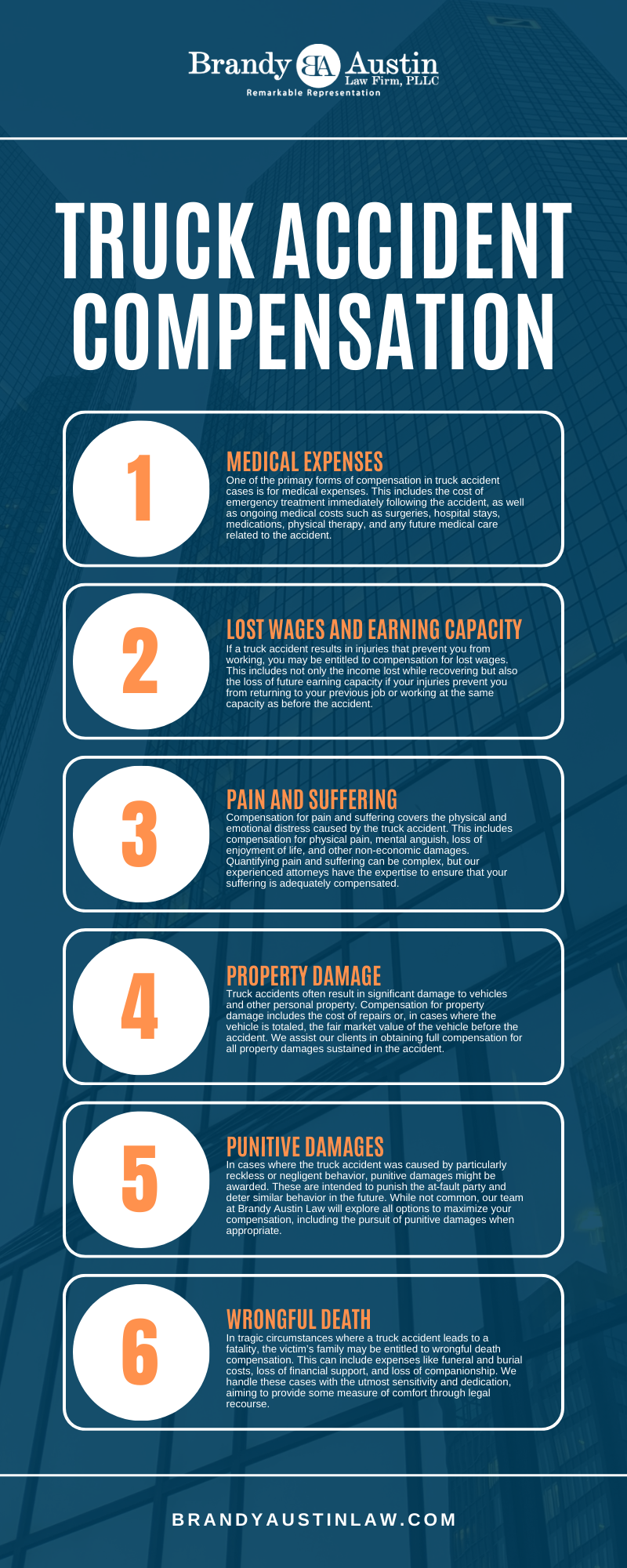
Texas Truck Accident Statistics
As one of the largest metro areas in the Lone Star State, Dallas-Fort Worth sees its share of semi-trucks speeding along I-75, I-635, and George Bush Tollway. We’ve all seen the aftermath of a devastating truck accident, though, with serious injuries for passengers in the smaller vehicle or vehicles and costly damage and trauma.
According to the Texas Department of Transportation, there were 26,298 tractor-trailer accidents in 2023. Out of those collisions, 443 of the crashes were fatal and 998 of the crashes were suspected to have caused serious injury.
The high number of accidents raises critical questions about safety regulations, driver training, and vehicle maintenance within the trucking industry. Many of these incidents could potentially be mitigated through stricter adherence to federal and state safety standards, including regulations set by the Federal Motor Carrier Safety Administration (FMCSA).
Victims of truck accidents may face extensive medical expenses, lost wages, and emotional distress, making it essential for them to understand their rights. Legal recourse may be available for those affected, allowing them to seek compensation for their injuries and damages.
As Texas continues to confront this alarming trend in tractor-trailer accidents, increased awareness, education, and enforcement of safety measures are vital to reducing these incidents and protecting both truck drivers and the public.
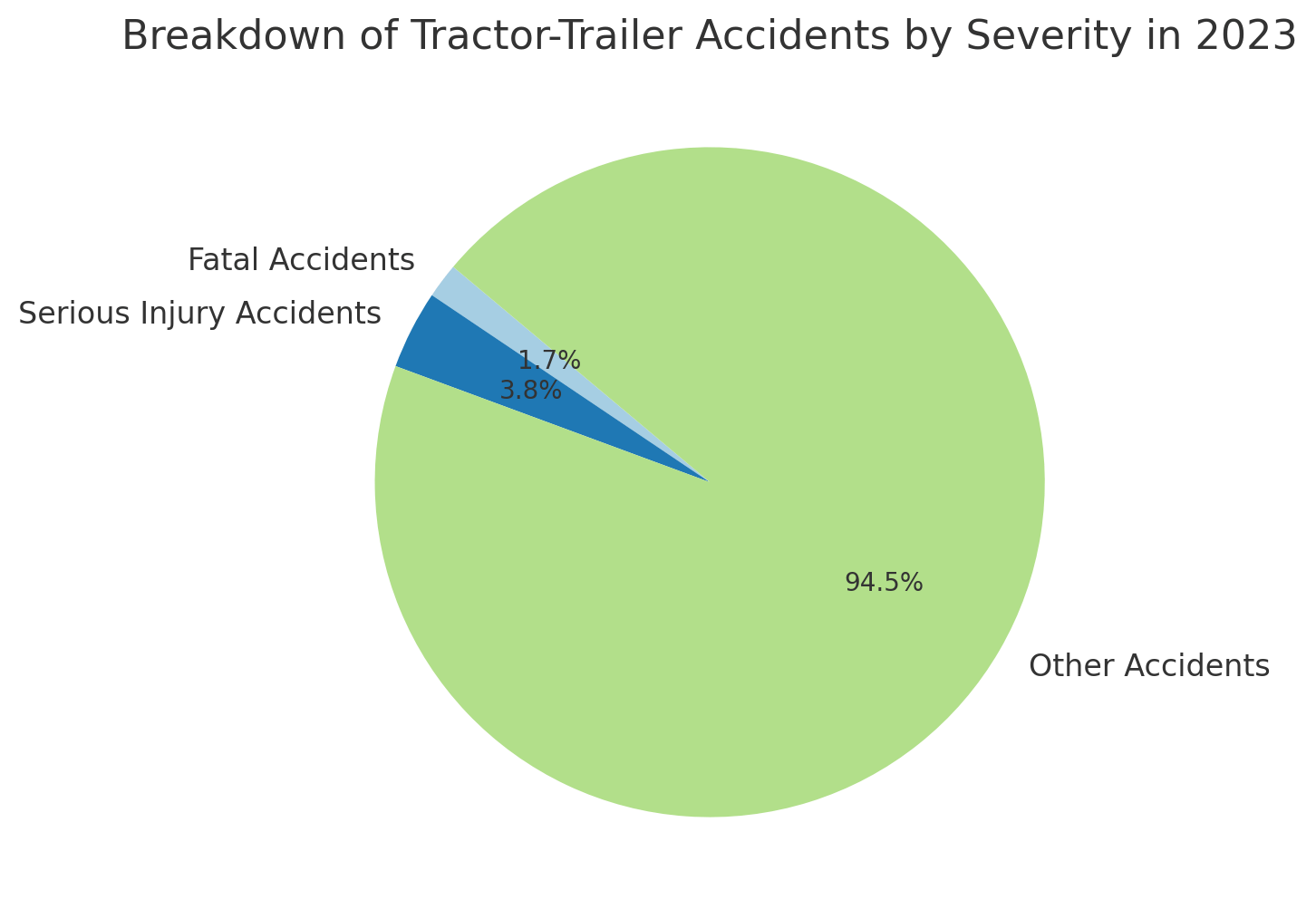
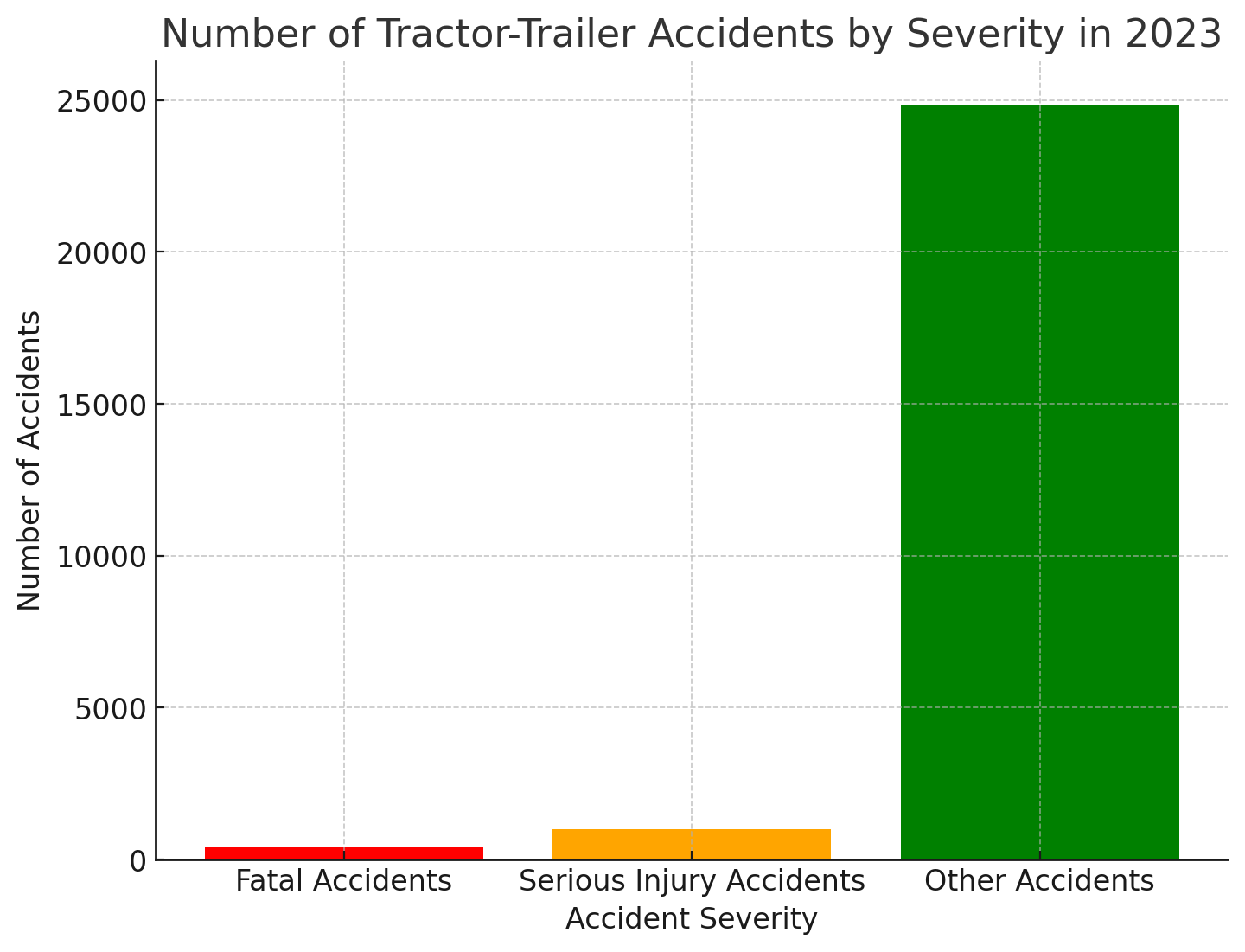
Truck Accident FAQs
How Do I Prove Negligence In A Truck Accident Case?
To prove negligence in a truck accident case, you must establish four key elements: duty of care, breach of duty, causation, and damages. First, demonstrate that the truck driver or other responsible parties (like the trucking company) had a legal obligation to operate safely.
Next, show that they breached this duty by acting recklessly or violating safety regulations, such as speeding, driving under the influence, or failing to maintain the vehicle.
Third, link this breach directly to the collision and your injuries. Finally, you must prove that the accident caused measurable damages, such as medical expenses, lost wages, property damage, or pain and suffering. Strong evidence, including witness statements, records, and expert testimony, is essential for building your case.
What If I’m Partially At Fault For The Truck Accident?
If you’re partially at fault for a truck accident, you may still be eligible to receive compensation, depending on your state’s laws. Most states follow comparative negligence rules, which allow you to recover damages even if you’re partly to blame.
However, your compensation will be reduced by your percentage of fault. For example, if you’re found 30% at fault and awarded $100,000, you’d receive $70,000. Some states follow modified comparative negligence, where you can only recover damages if you’re less than 50% or 51% at fault. We can help assess your case and determine your potential compensation.
How Do Trucking Regulations Affect My Case?
Trucking regulations, such as those set by the Federal Motor Carrier Safety Administration (FMCSA), play an influential role in your truck accident case. These regulations govern driver hours, vehicle maintenance, and safety standards.
If the truck driver or trucking company violated these rules, such as exceeding driving limits or failing to properly maintain the vehicle, it could serve as evidence of negligence. Violations of these regulations help strengthen your personal injury case by showing that the responsible party didn’t follow mandatory safety protocols. Our experienced lawyer will investigate whether any regulation breaches occurred to support your claim for compensation.
How Long Does It Take To Resolve A Truck Accident Case?
The time it takes to resolve a truck accident case varies significantly based on several factors. Generally, straightforward cases may settle within a few months, while more complicated cases involving significant injuries or disputes over liability can take a year or longer. Factors affecting the timeline include the severity of injuries, liability issues, the willingness of the insurance company to negotiate, and whether the case goes to trial.
Engaging our skilled truck accident lawyer can help streamline the process by ensuring thorough evidence collection and effective negotiation, potentially leading to a quicker resolution.
What Happens If The Trucking Company’s Insurance Denies My Claim?
If the trucking company’s insurance denies your claim, it’s essential to understand your options. First, carefully review the denial letter to understand the reasons behind it. Common reasons include insufficient evidence or disputes over liability. You can appeal the decision by providing additional evidence or documentation to support your personal injury claim.
If the denial remains, consider seeking legal assistance from one of our personal injury lawyers. We can help you manage the appeal process, negotiate with the insurance company, or file a personal injury lawsuit if necessary to pursue the compensation you deserve for your injuries and damages.
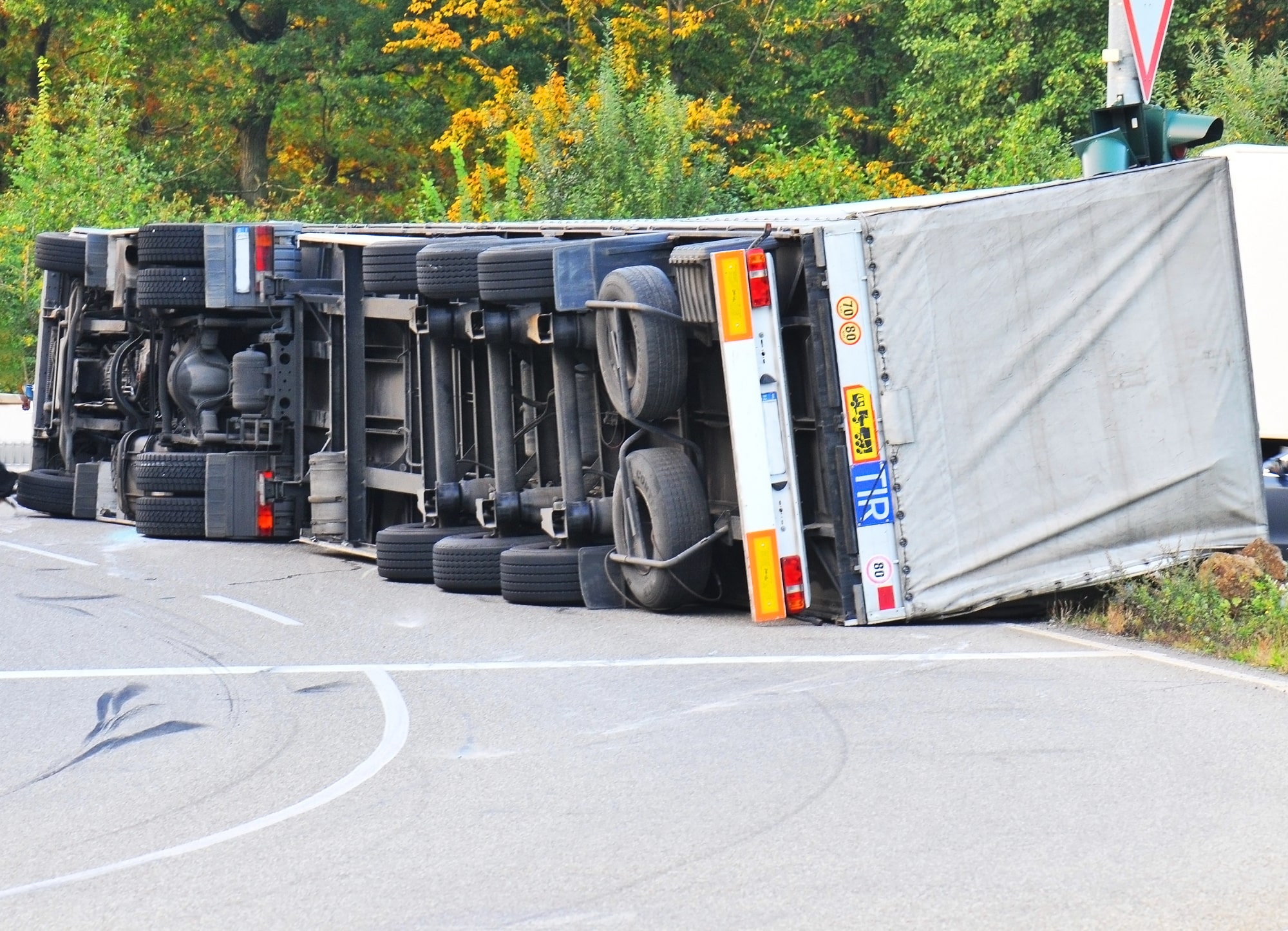
Dallas Truck Accident Glossary
At Brandy Austin Law Firm, our Dallas truck accident lawyer understands how confusing legal jargon can be for clients. Our team strives to provide clarity and support to our clients throughout their legal journey.
Commercial Driver’s License (CDL)
A Commercial Driver’s License (CDL) is a special driver’s license required for individuals operating large commercial vehicles, including semi-trucks, tractor-trailers, and buses. The process of obtaining a CDL is more rigorous than a standard driver’s license, requiring applicants to pass knowledge-based written exams, skills tests, and in some cases, medical examinations to ensure they meet federal safety standards. Truck drivers must comply with state and federal regulations regarding the operation of commercial vehicles. If a truck driver is found operating a vehicle without a valid CDL or in violation of CDL restrictions, it can result in liability for both the driver and their employer in the event of an accident.
Hours Of Service (HOS) Regulations
Hours of Service (HOS) regulations are federal laws enforced by the Federal Motor Carrier Safety Administration (FMCSA) that limit the number of hours truck drivers can operate a commercial vehicle before taking mandatory rest breaks. These regulations are designed to reduce driver fatigue, one of the leading causes of truck-related crashes. Under these rules, property-carrying drivers can drive a maximum of 11 hours after 10 consecutive hours off duty, and they cannot drive after 60/70 hours on duty in 7/8 consecutive days. Additionally, they must take a 30-minute break after 8 cumulative hours of driving. Violations of HOS regulations can lead to liability in a truck accident case, as exceeding driving limits increases the risk of drowsy driving and impaired reaction times.
Black Box (Event Data Recorder – EDR)
Many commercial trucks are equipped with an Event Data Recorder (EDR), commonly referred to as a black box, which records crucial data before, during, and after a crash. This device collects and stores information such as vehicle speed, braking patterns, throttle position, seatbelt usage, and steering inputs. In the event of a truck accident, this data can serve as critical evidence in determining the cause of the crash, whether due to driver error, mechanical failure, or external factors. Trucking companies often attempt to limit access to black box data, as it can be used against them in litigation. As a result, our experienced Dallas truck accident lawyer often requests the preservation and retrieval of this data early in the legal process to establish liability.
Jackknife Accident
A jackknife accident occurs when a truck’s trailer swings out to the side at a sharp angle, resembling a folding pocket knife. This type of crash is particularly dangerous as it can lead to the truck skidding uncontrollably, blocking multiple lanes of traffic, and causing pileups. Common causes of jackknifing include sudden braking, slippery road conditions, improper turning maneuvers, and mechanical failures such as faulty brakes or uneven weight distribution. These wrecks can be catastrophic, resulting in severe injuries or fatalities. Liability in jackknife accidents may be attributed to the truck driver, the trucking company, or even third parties, such as cargo loaders or vehicle maintenance providers, depending on the circumstances leading to the crash.
Blind Spots (No-Zones)
Blind spots, also known as “No-Zones,” refer to the large areas around a commercial truck where the driver’s visibility is significantly limited or completely obstructed. These blind spots exist on the sides, front, and rear of the truck, making it difficult for truck drivers to see smaller passenger vehicles, motorcycles, or pedestrians. Collisions often occur when a truck driver changes lanes, merges, or turns without noticing another vehicle in a blind spot. Federal regulations require trucking companies to provide proper training on blind spot awareness, and many modern trucks are equipped with sensors or cameras to mitigate blind spot risks. However, failure to check blind spots before maneuvering can result in serious liability for the truck driver and their employer.
Brandy Austin Law, Dallas Truck Accident Lawyer
2001 Ross Ave, Dallas, TX 75201
Contact Our Firm Today
At Brandy Austin Law, we are committed to providing our clients with the highest level of legal representation. Our experienced team is well-equipped to handle the unique challenges these cases present, from investigating the accident and dealing with insurance companies to fighting for the rightful compensation our clients deserve. When you’re ready, schedule a free consultation to speak with our Dallas truck accident lawyer.
